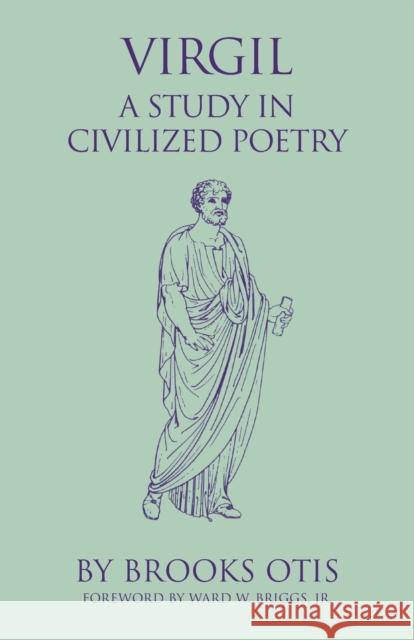Virgil, 20: A Study in Civilized Poetry » książka
Virgil, 20: A Study in Civilized Poetry
ISBN-13: 9780806127828 / Angielski / Miękka / 1995 / 462 str.
In this classic study, Brooks Otis presents Virgil as a radically different poet from any of his Greek or Roman predecessors. Virgil molded the ancient epic tradition to his own Roman contemporary aims and succeeded in making mythical and legendary figures meaningful to a sophisticated, unmythical age. Otis begins and ends his study with the Aeneid and includes chapters on the Bucolics and the Georgics. A new foreword by Ward W. Briggs, Jr., places Otis's groundbreaking achievement in the context of past and present Virgilian scholarship. "This is a very careful and perceptive study of the exact nature of Virgil's originality, and his use of Hellenistic and classical models to produce something completely unique, a heroic epic in an urban civilization. . . . It is] indispensable to all students of Virgin."-Classical World "Otis's important work is a significant American contribution to Virginian studies and will rightly take its place as one of the most formidable and most reliable analyses available on the greatest of Roman poets."-World Literature Today " S]hould form the core of every Vergilian's library."-Classical Journal " E]very teacher, student, and lover of Vergil should buy and read it and ponder Otis's many new suggestions and interpretations. Some may not agree with every detail, but all will have a deepened and enriched understanding of Vergil's poetry."-American Journal of Philology Volume 20 in the Oklahoma Series in Classical Culture Brooks Otis was Professor of Classics at Stanford University (later Professor of Latin at the University of North Carolina) and the author of Ovid As an Epic Poet and Cosmos and Tragedy. Ward W. Briggs, Jr., is Professor of Classics at the University of South Carolina. He is the author of Narrative and Simile from the Georgics in the Aeneid, coeditor of Classical Scholarship: A Biographical Dictionary, and the editor of the journal Vergilius.
In this classic study, Brooks Otis presents Virgil as a radically different poet from any of his Greek or Roman predecessors. Virgil molded the ancient epic tradition to his own Roman contemporary aims and succeeded in making mythical and legendary figures meaningful to a sophisticated, unmythical age. Otis begins and ends his study with the Aeneid and includes chapters on the Bucolics and the Georgics. A new foreword by Ward W. Briggs, Jr., places Otiss groundbreaking achievement in the context of past and present Virgilian scholarship."This is a very careful and perceptive study of the exact nature of Virgils originality, and his use of Hellenistic and classical models to produce something completely unique, a heroic epic in an urban civilization. . . . [It is] indispensable to all students of Virgin."-Classical World"Otiss important work is a significant American contribution to Virginian studies and will rightly take its place as one of the most formidable and most reliable analyses available on the greatest of Roman poets."-World Literature Today"[S]hould form the core of every Vergilians library."-Classical Journal"[E]very teacher, student, and lover of Vergil should buy and read it and ponder Otiss many new suggestions and interpretations. Some may not agree with every detail, but all will have a deepened and enriched understanding of Vergils poetry."-American Journal of PhilologyVolume 20 in the Oklahoma Series in Classical CultureBrooks Otis was Professor of Classics at Stanford University (later Professor of Latin at the University of North Carolina) and the author of Ovid As an Epic Poet and Cosmos and Tragedy. Ward W. Briggs, Jr., is Professor of Classics at the University of South Carolina. He is the author of Narrative and Simile from the Georgics in the Aeneid, coeditor of Classical Scholarship: A Biographical Dictionary, and the editor of the journal Vergilius.











